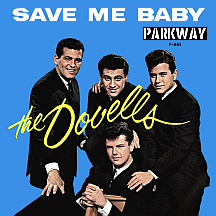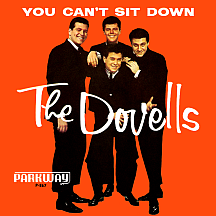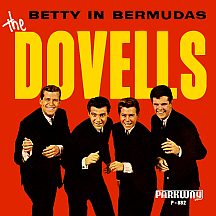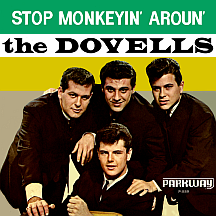THE DOVELLS
Several student songsters at Overbrook High School, basketball superstar Wilt Chamberlain's alma mater, made the most of their geographical good fortune in the late 1950s and early '60s. Philadelphia had become a musical hotbed after the locally-produced, nationally-televised American Bandstand took off in the summer of '57, giving the show's producers (including host Dick Clark) the unprecedented power, by virtue of the show's enormous popularity, to break recording acts and help shape the tastes of America's youth. These Overbrook boys formed at about that time, briefly calling themselves The Cashmeres, then The Brooktones as a tribute to the school (both names, it turned out, were being used by groups in other parts of the country), setting their sights on the big prize and achieving it after four years of adjustments, ending up as The Dovells and gaining notice with a hit song that made Bristol, Pennsylvania, a small town about 20 miles up the road from Philly, a nationally-known city.
All six initial group members were in their mid-teens in 1957. Jerry Gross and Leonard Borisoff served as lead tenors; Arnie Silver, Mike Freda, Mark Gordesky and bass Jim Mealey completed the lineup. Having every intention of being stars, each concocted a stage name: Gross became Jerry Summers, Silver was Arnie Satin, Freda was Mike Dennis and Gordesky decided on Mark Stevens. Mealey deviated most, becoming Danny Brooks. Borisoff's alias, Len Barry, was to have the most long-term familiarity. Dissension set in early and Jerry and Mike left to join The Gems (probably the first but not the most notable act to use the name), rejoining the group, still the Brooktones (despite there being a girl group by that name with a couple of '58 singles on Coed), a couple of years later when Len tipped them that Bernie Lowe of Philly's Cameo-Parkway Records had shown interest in the group.
Lowe insisted on a name change and suggested The Deauvilles after the Deauville Resort Hotel in Miami Beach where he had recently vacationed. The guys weren't exactly thrilled with it but struck a compromise, changing the spelling (and pronunciation, slightly) to Dovells. Gordesky/Stevens had left by the time the recording deal came about; the remaining five got their feet wet doing backing vocals on studio sessions for Chubby Checker and others. The first Dovells disc on Parkway, Barry's "No No No," an uptempo but generally uninspired tune, generated little interest in the spring.
The doo wop and R&B of the 1950s clearly held the most fascination for the group; Frankie Lymon and the Teenagers' '57 ballad "Out in the Cold Again" (penned in the '30s by Ted Koehler and Rube Bloom) was considered as a follow-up, but its flip side was what did the trick. Kal Mann and Dave Appell came up with a driving dance tune, "Goodwill Stomp," as a tie-in to a popular dance (according to one of the label's promotion men) that high schoolers in Bristol were doing at the city's Goodwill Fire Hall. Basing it loosely on the rhythm of The Students' three-year-old "Everyday of the Week," they changed the title to the more catchy "Bristol Stomp." After a slow start at the beginning of summer, the record (with a different B side) caught on (the difference being Bandstand began hyping it), hitting the national charts in September '61 and climbing as high as number two by the end of October.
Mann and Appell's "Do the New Continental" hit the top 40 in March 1962 as the quintet lip-synced the first two hits in the big screen teen-appeal movie Don't Knock the Twist, headlined by Parkway's Twist-master Chubby Checker and the company's soon-to-be "Mashed Potato Time" star Dee Dee Sharp (another Overbrook High graduate) in addition to Gene Chandler, Linda Scott and Vic Dana. The doo wop revival formula was abandoned in favor of the dance-fad-of-the-moment, and the Dovells were fine with that (except Mealey/Brooks, perhaps, who departed that year for personal reasons). "Bristol Twistin' Annie," composed by Robert Lewis and Johnny Styles, had a solid run at the beginning of summer and Mann and Appell's perspective on a two-year-old dance craze, "Hully Gully Baby," was even stronger in the fall.
An attempt to revive 1930s dance "The Jitterbug" (Len and Jerry received writer credit for this one) fell short of the mark, but the group landed a second top ten smash in the spring of 1963 with a remake of "You Can't Sit Down," the Philip Upchurch Combo's summer '61 hit (Upchurch composed it with singer Dee Clark and Cornell Muldrow). The Dovells had marveled at a performance by Upchurch of the scorching instrumental sax track during a show at the Harlem Club in Atlantic City and decided to do a vocal version; lyrics were added by Jan Sheldon (thought to be a pseudonym for Mann-Appell), complete with an in-house reference to Philly's "South Street," immortalized in song a few months earlier by Cameo quartet (and Overbrook alumni) The Orlons. "Wildwood Days" was the next Dovells single, but flip side "Sit Down" ran away with the airplay (label star Bobby Rydell had a hit with "Wildwood" shortly afterwards).
Several more singles were released over the next year, of which the Mann-Appell songs "Betty in Bermudas" (written with assistance from Teaneck, New Jersey's beloved Rose Marie McCoy) and "Stop Monkeyin' Aroun'" made minor chart appearances. The group had many arguments (getting along better when the big hits were happening but at each other's throats during the down times); disagreements about studio recordings and stage presentation were common. After a big backstage blowup in December 1963, Borisoff/Barry quit to try his hand at a solo career. He made two singles for Cameo as Len Barry in 1964 before permanently cutting ties with the company. Cameo-Parkway, suddenly struggling to compete against the new sounds coming from England and the sharp rise of Motown, cut the Dovells loose late in the year; Gross/Summers, Silver/Satin and Freda/Dennis continued as a trio. "(Hey, Hey, Hey) Alright" appeared on Swan in '65 and "Love is Everywhere," produced by Nick Massi of The 4 Seasons, popped up on MGM in '66.
Barry, meanwhile, signed with Decca Records and scored a major hit, "1-2-3," in the fall of 1965, following it with a few more hits in '66. The three remaining members of The Dovells struggled onward, making a steady living performing their hits. Fans of Rowan and Martin's Laugh-In, the topical comedy-variety show that had taken TV by storm since its premiere on NBC in September 1967, they decided to record a song based on the show's wacky "Judge" routines. "Here Come the Judge" was written by Gross and Freda and recorded independently with a female lead, gospel singer Jeannie Yost. The over-the-top novelty recording was sold to MGM Records as-is, The Magistrates ended up as the group name on the label and Yost was credited as Jean Hillary. She joined the Dovells on the road, performing the song with them as a comedy segment. The single made a respectable showing on the charts in mid-1968 despite competition from different but similarly-conceived "Judge" records by Motown's Shorty Long and comic actor Pigmeat Markham (who also played the character on the show), both bigger hits; an instrumental, "Here Come Da Judge" by The Buena Vistas, was also out at the time.
Mike Freda left the Dovells in 1969 and original member Mark Gordesky replaced him, keeping the group a trio. They continued recording in the 1970s for Event, Verve and Paramount, also making another non-Magistrates record for MGM. One final single on Event, a remake of Martha and the Vandellas' ten-year-old hit "Dancing in the Street," grabbed a little attention in 1974. Arnie Satin left later in the decade, leaving Gordesky and Jerry Gross to carry on, with backing musicians, as The Dovells evolved into a music-and-comedy act. In 1992 they met Bill Clinton while he was on the campaign trail. On January 20, 1993, at the Presidential Inaugural Ball, Jerry and Mark joined saxophone-playing chief executive Clinton and other musicians for an onstage jam session; the song was a lyrically-adjusted version of their own 1963 hit "You Can't Sit Down."
NOTABLE SINGLES:
- No No No - 1961
- Bristol Stomp - 1961
- Do the New Continental - 1962
- Bristol Twistin' Annie - 1962
- Hully Gully Baby - 1962
- The Jitterbug - 1962
- You Can't Sit Down /
Stompin' Everywhere - 1963 - Betty in Bermudas - 1963
- Stop Monkeyin' Aroun' - 1963
- (Hey, Hey, Hey) Alright - 1965
- Love is Everywhere - 1966
- Here Come the Judge - 1968
as the Magistrates - Our Winter Love - 1969
- Dancing in the Street - 1974





